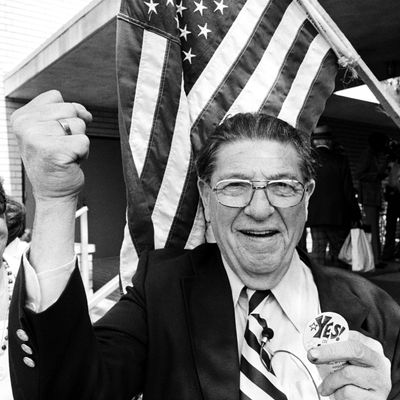
California is not going to be a presidential battleground state in 2020, unless something truly apocalyptic strikes the Democratic opponent to the Golden State’s least favorite president ever, Donald Trump. Nor is there going to be a statewide Senate or gubernatorial race. Yes, Republicans will make an effort to claw back some of the seven U.S. House seats in California they lost in the midterms, and there will be another installment in the recently familiar struggle to strengthen or disrupt a Democratic supermajority in the state legislature. But most of the drama over elected offices could end with California’s unusually early March 3 Democratic presidential primary.
In California, of course, elections often feature major ballot initiatives as well as elected official tilts. And the 2020 election is very likely going to feature the biggest, baddest, most expensive ballot-initiative fight in the state’s long history of voter-imposed laws. As I explained a year ago, a long-awaited progressive effort to strip Prop 13 tax protections from commercial property may finally be on tap for November 3, 2020:
[I]t’s now likely that an effort to significantly roll back Proposition 13, the famed property tax limitation initiative enacted by voters in 1978, will be on the ballot in 2020. And it will likely split the political world right down the middle, with huge stakes for commercial property owners and the state and local governments (and particularly the schools) that rely on property taxes.
Prop 13 capped property taxes at one percent of assessed value at time of acquisition, and limited upward reassessments of property values to 2 percent per year so long as the property didn’t change hands. Over time it has had a profound effect on the entire taxation system in California, and has produced wildly variable property taxes on similar properties, depending on how recently they were built or acquired.
Vigilant longtime homeowners are the backbone of support for Prop 13. But the system treats residential and commercial real estate exactly the same. So for years, left-of-center political advocates and policy wonks have dreamed of a reform that would create a “split roll” approach where commercial properties would lose Prop 13 protections and be treated for tax purposes like real estate in the rest of the country.
Why 2020? Well, the state has most definitely been drifting to the left in recent years, and a presidential electorate is likely to be larger and more pro-Democratic than a midterm electorate. Perhaps of equal importance, Democratic governor Jerry Brown — who was in office when the original Prop 13 passed (over his objections) in 1978 — had long opposed such a fundamental reevaluation of the tax system at the ballot box. His successor Gavin Newsom isn’t onboard the split-roll bandwagon — he’s reportedly trying to work out some legislative compromise to make the ballot fight unnecessary — but isn’t opposed to it, either. The coalition behind the proposed change is pretty formidable, as the Los Angeles Times reports:
A coalition of liberal community activists put up enough cash in 2018 to pay for signature gathering and qualify an initiative for the ballot. But the group probably lacked the money needed to wage a full-scale campaign.
The group that unveiled a replacement version of the ballot measure Tuesday includes some of California’s most powerful public employee unions — including Service Employees International Union, the California Teachers Assn. and the California Federation of Teachers. Their decision to endorse the effort makes it likely that tens of millions of dollars will be at the ready for the campaign ahead.
Backers of a split-roll reform have also modified the initiative’s language to exempt small businesses (those with 50 or fewer employees) from exposure to higher tax valuations on property valued at less than $3 million. This will presumably keep the giant businesses that will soon go to war to kill split-roll from hiding behind mom-and-pop enterprises. By some estimates, more than $7 billion a year in tax revenue for the state is at stake, and the war will most definitely be waged at a cost commensurate with the stakes:
Joel Fox, who cut his political teeth as a tax-cutting apprentice to Howard Jarvis, the iconic champion of Proposition 13, said big business has always been an easy target for those who have blamed the law for a variety of California’s problems …
In a statement on Tuesday, California Business Roundtable President Rob Lapsley called the 2020 ballot measure “a major, multibillion-dollar tax on all Californians in the form of higher prices on everything we buy — from groceries and gasoline to diapers and day care.” He and other business leaders promised an “aggressive” campaign to kill it …
Fox, who said Proposition 13 supporters believe that the ballot measure won’t stop at loosening commercial property tax rules, predicted the business community will spend whatever it takes to defend the system as it has existed for 40 years.
While this will mostly be a classic left-right, business–versus–unions and governments battle, California’s progressive tilt doesn’t guarantee victory for split-roll. As noted above, corporate types will offer a slippery-slope claim that once the taxman has feasted on commercial property taxes, homeowners will inevitably be next. And there are some affordable-housing advocates who fear split-roll will perversely incentivize commercial real-estate development by making it a larger revenue generator for local governments.
Preliminary polling shows split-roll commanding a sparse majority of popular support. But by the time this expensive slugfest comes to a close, anything could happen.






























